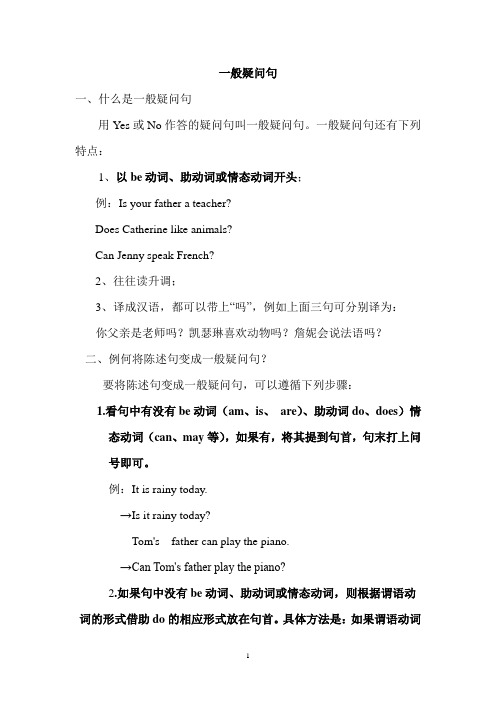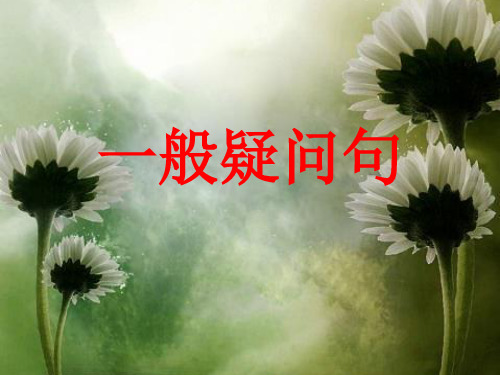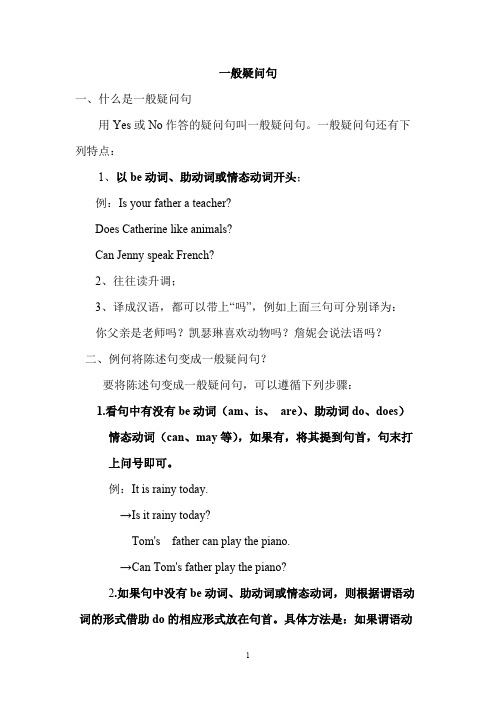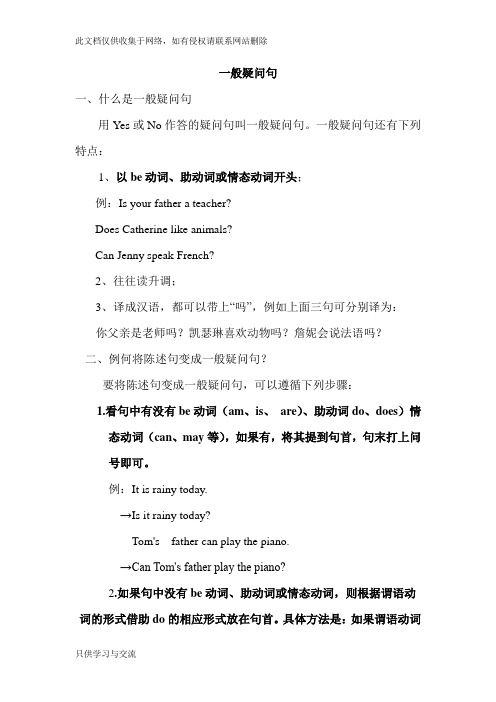四年级一般疑问句
四年级英语u4一般疑问句练习题

四年级英语u4一般疑问句练习题一般疑问句是英语中用来提问的句型,通常以助动词、情态动词或者be动词开头。
下面是一些适合四年级学生的英语一般疑问句练习题:1. Be动词的一般疑问句:- 原句:She is a teacher.- 疑问句:Is she a teacher?- 原句:They are playing football.- 疑问句:Are they playing football?2. 助动词Do/Does的一般疑问句:- 原句:I watch TV every evening.- 疑问句:Do you watch TV every evening?- 原句:He does his homework after school.- 疑问句:Does he do his homework after school?3. 情态动词的一般疑问句:- 原句:She can swim.- 疑问句:Can she swim?- 原句:We should help each other.- 疑问句:Should we help each other?4. 特殊疑问句变一般疑问句:- 特殊疑问句:What time does he go to bed?- 一般疑问句:Does he go to bed at what time?5. 否定形式的一般疑问句:- 原句:They don't like apples.- 疑问句:Don't they like apples?6. 回答一般疑问句:- 问题:Is your father a doctor?- 肯定回答:Yes, he is.- 否定回答:No, he isn't.7. 选择疑问句:- 问题:Do you want to play basketball or soccer?- 回答示例:I want to play basketball.8. 含有some和any的一般疑问句:- 问题:Would you like some juice or milk?- 回答示例:I would like some juice.9. 含有频率副词的一般疑问句:- 问题:How often do you visit your grandparents?- 回答示例:I visit them every weekend.10. 含有there be结构的一般疑问句:- 问题:Is there a book on the table?- 回答示例:Yes, there is.这些练习题可以帮助学生熟悉一般疑问句的构成和回答方式,通过不断的练习,学生可以更加自如地使用英语进行日常交流。
四年级英语一般疑问句的构成及回答练习题40题

四年级英语一般疑问句的构成及回答练习题40题1.Is this a pencil?A.Yes,it is.B.No,it isn't.C.Yes,this is.D.No,this isn't.答案:A、B。
一般疑问句以be 动词开头,回答用“Yes,it is.”或者“No,it isn't.”,this 在回答中要用it 来代替。
C、D 选项错误。
2.Is that a book?A.Yes,it is.B.No,it isn't.C.Yes,that is.D.No,that isn't.答案:A、B。
一般疑问句以be 动词开头,回答用“Yes,it is.”或者“No,it isn't.”,that 在回答中要用it 来代替。
C、D 选项错误。
3.Is he reading a book?A.Yes,he is.B.No,he isn't.C.Yes,he's.D.No,he not.答案:A、B。
一般疑问句以be 动词开头,回答用“Yes,he is.”或者“No,he isn't.”,C 选项he's 不能单独作为回答,D 选项缺少is。
4.Is she singing a song?A.Yes,she is.B.No,she isn't.C.Yes,she's.D.No,she not.答案:A、B。
一般疑问句以be 动词开头,回答用“Yes,she is.”或者“No,she isn't.”,C 选项she's 不能单独作为回答,D 选项缺少is。
5.Is it a cat?A.Yes,it is.B.No,it isn't.C.Yes,this is.D.No,this isn't.答案:A、B。
一般疑问句以be 动词开头,回答用“Yes,it is.”或者“No,it isn't.”,C、D 选项中this 错误。
小学四年级陈述句变一般疑问句包含练习及答案知识讲解

一般疑问句一、什么是一般疑问句用Yes或No作答的疑问句叫一般疑问句。
一般疑问句还有下列特点:1、以be动词、助动词或情态动词开头;例:Is your father a teacher?Does Catherine like animals?Can Jenny speak French?2、往往读升调;3、译成汉语,都可以带上“吗”,例如上面三句可分别译为:你父亲是老师吗?凯瑟琳喜欢动物吗?詹妮会说法语吗?二、例何将陈述句变成一般疑问句?要将陈述句变成一般疑问句,可以遵循下列步骤:1.看句中有没有be动词(am、is、are)、助动词do、does)情态动词(can、may等),如果有,将其提到句首,句末打上问号即可。
例:It is rainy today.Ts it rainy today?Tom's father can play the piano.—Can Tom's father play the piano?2.如果句中没有be动词、助动词或情态动词,则根据谓语动词的形式借助do的相应形式放在句首。
具体方法是:如果谓语动词是原形,则借do;如果谓语动词是一般现在时第三人称单数形式,则借does.记得助动词和情态动词后面接动词原形。
例:They go to school by bike.—Do they go to school by bike?Bill gets up at 6:30 every day.—Does bill get up at 6:30 every day?三.陈述句变一般疑问句应注意的事项陈述句变成一般疑问句除了遵循上述规则以外,还应注意下列几点:1.如果陈述句中有第一人称,则变问句时最好要变为第二人称。
例:I usually have lunch at school.—Do you usually have lunch at school?My father is playing soccer.—Is your father playing soccer?2.如果陈述句中有some,则变问句时往往要变成any。
小学四年级陈述句变一般疑问句(包含练习及答案)

一般疑问句一、什么是一般疑问句用Yes或No作答的疑问句叫一般疑问句。
一般疑问句还有下列特点:1、以be动词、助动词或情态动词开头;例:Is your father a teacher?Does Catherine like animals?Can Jenny speak French?2、往往读升调;3、译成汉语,都可以带上“吗”,例如上面三句可分别译为:你父亲是老师吗?凯瑟琳喜欢动物吗?詹妮会说法语吗?二、例何将陈述句变成一般疑问句?要将陈述句变成一般疑问句,可以遵循下列步骤:1.看句中有没有be动词(am、is、are)、助动词do、does)情态动词(can、may等),如果有,将其提到句首,句末打上问号即可。
例:It is rainy today.→Is it rainy today?Tom's father can play the piano.→Can Tom's father play the piano?2.如果句中没有be动词、助动词或情态动词,则根据谓语动词的形式借助do的相应形式放在句首。
具体方法是:如果谓语动词是原形,则借do;如果谓语动词是一般现在时第三人称单数形式,则借does.记得助动词和情态动词后面接动词原形。
例:They go to school by bike.→Do they go to school by bike?Bill gets up at 6:30 every day.→Does bill get up at 6:30 every day?三.陈述句变一般疑问句应注意的事项陈述句变成一般疑问句除了遵循上述规则以外,还应注意下列几点:1.如果陈述句中有第一人称,则变问句时最好要变为第二人称。
例:I usually have lunch at school.→Do you usually have lunch at school?My father is playing soccer.→Is your father playing soccer?2.如果陈述句中有some, 则变问句时往往要变成any 。
四年级一般疑问句

•I am a doctor. ________________________ •They are good friends. ___________________________ •It is a beautiful park. __________________________ •It is a big map. __________________________ •You are a singer. ____它是指用yes(是)或no(否)来回答的句 子。 其结构是: be +主语+其他成分 +? 通常回答为: 肯定:Yes,+主语+提问的be动词 否定:No,+主语+提问的be动词+not 先找系动词be(am ,is ,are,) 提前(小写变大写,大写变小写。)
二、物主代词
单数
第一 人称 第二 人称 第三 人称
复数
第一 人称 第二人称 第三 人称
形容词性物主 代词
my
your
his
her
its
our
your
their
汉语
我的
你的
他的
她的
它的
我们的
你们的
他(她、 它)们的
3变人称(第一人称变第二人称,第三人称 不变) 4加问号? 口诀:
be动词提前 大小写互变 句号变问号 读时用声调 一人称变二人称
•It is a lovely dog. _______________ •She is a lovely girl.___________ •He is my father . •Is he your father? •They are Lily’s cousins. __________________________ •We are classmates. __________________________
(完整版)小学四年级陈述句变一般疑问句(包含练习及答案)

一般疑问句一、什么是一般疑问句用Yes或No作答的疑问句叫一般疑问句。
一般疑问句还有下列特点:1、以be动词、助动词或情态动词开头;例:Is your father a teacher?Does Catherine like animals?Can Jenny speak French?2、往往读升调;3、译成汉语,都可以带上“吗”,例如上面三句可分别译为:你父亲是老师吗?凯瑟琳喜欢动物吗?詹妮会说法语吗?二、例何将陈述句变成一般疑问句?要将陈述句变成一般疑问句,可以遵循下列步骤:1.看句中有没有be动词(am、is、are)、助动词do、does)情态动词(can、may等),如果有,将其提到句首,句末打上问号即可。
例:It is rainy today.→Is it rainy today?Tom's father can play the piano.→Can Tom's father play the piano?2.如果句中没有be动词、助动词或情态动词,则根据谓语动词的形式借助do的相应形式放在句首。
具体方法是:如果谓语动词是原形,则借do;如果谓语动词是一般现在时第三人称单数形式,则借does.记得助动词和情态动词后面接动词原形。
例:They go to school by bike.→Do they go to school by bike?Bill gets up at 6:30 every day.→Does bill get up at 6:30 every day?三.陈述句变一般疑问句应注意的事项陈述句变成一般疑问句除了遵循上述规则以外,还应注意下列几点:1.如果陈述句中有第一人称,则变问句时最好要变为第二人称。
例:I usually have lunch at school.→Do you usually have lunch at school?My father is playing soccer.→Is your father playing soccer?2.如果陈述句中有some, 则变问句时往往要变成any 。
小学四年级陈述句变一般疑问句(包含练习及答案)知识讲解

一般疑问句一、什么是一般疑问句用Yes或No作答的疑问句叫一般疑问句。
一般疑问句还有下列特点:1、以be动词、助动词或情态动词开头;例:Is your father a teacher?Does Catherine like animals?Can Jenny speak French?2、往往读升调;3、译成汉语,都可以带上“吗”,例如上面三句可分别译为:你父亲是老师吗?凯瑟琳喜欢动物吗?詹妮会说法语吗?二、例何将陈述句变成一般疑问句?要将陈述句变成一般疑问句,可以遵循下列步骤:1.看句中有没有be动词(am、is、are)、助动词do、does)情态动词(can、may等),如果有,将其提到句首,句末打上问号即可。
例:It is rainy today.→Is it rainy today?Tom's father can play the piano.→Can Tom's father play the piano?2.如果句中没有be动词、助动词或情态动词,则根据谓语动词的形式借助do的相应形式放在句首。
具体方法是:如果谓语动词是原形,则借do;如果谓语动词是一般现在时第三人称单数形式,则借does.记得助动词和情态动词后面接动词原形。
例:They go to school by bike.→Do they go to school by bike?Bill gets up at 6:30 every day.→Does bill get up at 6:30 every day?三.陈述句变一般疑问句应注意的事项陈述句变成一般疑问句除了遵循上述规则以外,还应注意下列几点:1.如果陈述句中有第一人称,则变问句时最好要变为第二人称。
例:I usually have lunch at school.→Do you usually have lunch at school?My father is playing soccer.→Is your father playing soccer?2.如果陈述句中有some, 则变问句时往往要变成any 。
四年级-一般疑问句和特殊疑问句

四年级-⼀般疑问句和特殊疑问句⼀般疑问句和特殊疑问句【⼀般疑问句】⼀、什么是⼀般疑问句?答:能⽤yes / no(或相当于yes / no)回答的问句叫⼀般疑问句。
如何将陈述句变为⼀般疑问句1、第⼀家族:含be动词或情态动词的句⼦秘诀:⼀调⼆改三问号⼀调:即把句中的be或情态动词调到主语前;⼆改:改换主语称谓,即将句中的主语I\my \mines\we\our\ours等第⼀⼈称分别改为相应的第⼆⼈称you\your\ yours等;三问号:句末的句号改为问号。
如:. I am an English teacher. → Are you an English teacher?. We can speak English fluently. → Can you speak English fluently?2、第⼆家族:含⾏为动词(或称为实义动词)的句⼦秘诀:⼀加⼆改三问号⼀加:即在句⾸加助动词Do或Does;⼆改:1、把谓语动词改为原形;2、改换主语称谓(同第⼀家组);三问号:句末的句号改为问号。
. We read English every morning. → Do you read English every morning?. Tom’s father listens to English on the radio every evening. →Does Tom’s father listen to English on the radio every evening?特别注意:对于第⼆家族⼀定要注意动词的还原,因为时态与数的变化已经体现在助动词上了。
3、加强记忆⼝诀:“肯变⼀,并不难,can 或be提在前;谓语若为⾏为动,do 或does句⾸⽤。
”六、“some”还是“any”?在⼀般疑问句中,要表达“⼀些”时,⼀般⽤any,但如果这个问句是⽤来表达“建议、请求、邀请”等交际功能时,应该some. Is there any tea in the cup?. Do you have any children?. May I have some fish?Would you like some tea?Shall we buy some vegetables?Can I borrow some money from you?Why not have some bread?How about some orange juice?练练吧⼀、改为⼀般疑问句1. I can skate well. __________ __________skate well?2. Kate does morning exercises every day.________ Kate________ morning exercises every day?3. The exam begins at nine. __________ the exam__________ at nine?4. Ann returned the book to the library yesterday._______ Ann_______ the book to the library yesterday?5. There's something to eat in the cupboard.__________ there__________ to eat in the cupboard?6. Mary likes scuba diving very much._________ Mary_________ scuba diving very much?⼆、⽤ is, are, am ,do, did ,does ,can 填空,然后变成⼀般疑问句1. His father ____an English teacher.2. These children_____ crying.3. They______swim.4. ______ you like reading English? Yes, I like reading English.5. How _____you go to school? I go to school on foot.6. What _____he like? He likes English.7. _____ his father go to work by bus? No, his father rides a bike to work.8. ______ your father read newspaper last night? No, he read a story book.9.I ____ a teacher.⼀般疑问句10. He ____ a doctor.⼀般疑问句11.You _____ good workers.⼀般疑问句12.______ (它是) an apple.⼀般疑问句13.They _____ workers.⼀般疑问句14.I _____ three books.⼀般疑问句He ____ many trees.⼀般疑问句I can speak English.⼀般疑问句They can swim.⼀般疑问句Shall he call you tonight?陈述句I need finish my work.⼀般疑问句【特殊疑问句】特殊疑问句要由疑问代词或疑问副词开头,询问的内容不同, 使⽤的疑问词也不同。
- 1、下载文档前请自行甄别文档内容的完整性,平台不提供额外的编辑、内容补充、找答案等附加服务。
- 2、"仅部分预览"的文档,不可在线预览部分如存在完整性等问题,可反馈申请退款(可完整预览的文档不适用该条件!)。
- 3、如文档侵犯您的权益,请联系客服反馈,我们会尽快为您处理(人工客服工作时间:9:00-18:30)。
肯定句
I am tall.
I am a girl.
we are strong.
一般疑问句
Are you tall?
肯定回答:Yes,I am. 否定回答:No,I am not.
Are you a girl?
肯定回答:Yes,I am. 否定回答:No,I am not.
Are you strong?
肯定回答:Yes,we are. 否定回答:No,we aren't.
肯定句 变 一般疑问句
1.找到be(am,is,are)动词,把be提前
2.看到is,就把is提前放句首,首字母大写Is 看到are,就把are提前放句首,首字母大写Are
3.句子结尾加问号“?”
看到I am或We are,要改成Are you.....? (第一人称改第二人称,be动词也要随着改变)
如果有人问你,你今年是九岁吗? 你会怎么回答?
你一定会说,是或者不是。
这种只回答“是”或者“不是”的问句, 在英语中叫做一般疑问句。
肯定句
一般疑问句
It is a bag.
Is
it
a
bag?Biblioteka Yes,it is. 肯定回答 No,it isn't.否定回答
Jim is six.
Is
Jim
six?
Yes,he is. 肯定回答 No,he isn't.否定回答
4.肯定回答用Yes,it/she /he is./ Yes,we/they are. Yes, I am. 否定回答用No,it/she /he isn't. No,we/they aren't. No,I am not.(前后关系要一致)
That is a dog. Is that a dog?
Yes,it is. 肯定回答 No,it isn't.否定回答
They are friendly. Are they friendly? Yes,they are.肯定回答 No,they aren't.否定回答
Jim and Mary are sad. Are Jim and Mary sad? Yes,they are.肯定回答 No,they aren't.否定回答
